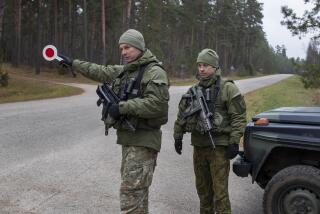Lithuania Has Proof: an Embassy
- Share via
VILNIUS, Soviet Union — Antanas Varanka focused his camera on the colorful Swedish emblem posted on the facade of the first foreign embassy to open in Lithuania, pushed the shutter release and grinned ear-to-ear.
“I saw this sign yesterday when I was just walking by on other business,” said Varanka, a 54-year-old Lithuanian independence activist. “Today I came back with my camera to catch this historic moment on film.
“This means a whole lot to me,” Varanka, a professional photographer, said with a voice full of pride. “At last Lithuania has become an independent state--by law and de facto . It makes me very happy, and I think every Lithuanian resident who looks at this sign will feel that the world has finally accepted us.”
Almost everyone who walked by the sign stopped and smiled. Many who passed by quickly did double takes and paused to soak in the importance of the oblong plaque with a black background and bright red crown. Lithuanians walking with children and grandchildren pointed to the plaque and explained its significance to the young ones.
“We’ve wanted this for such a long time,” said Inga Kaupinite, 20, a linguistics student. “We’ve always had to do everything through Moscow, but now foreign diplomats are flocking to little Lithuania.”
Although Sweden was the only country to actually open an embassy last week in Vilnius, the Lithuanian capital, a quaint city of cobblestone streets and Hanseatic architecture, is bustling with diplomatic visitors from as far away as Japan.
Since the reactionary Kremlin coup was quashed, Lithuania’s banquet halls have been tightly scheduled with cocktail parties, meals and receptions for visiting dignitaries who swarmed to Lithuania at a rate no one could have predicted, said Virginija Benediene, a spokeswoman for the Lithuanian Foreign Ministry.
“It was impossible to predict this because no one expected the quick change in the political situation that was brought on by the putsch,” an exhausted but happy Benediene added. “We are working at a very hectic pace, but we wouldn’t have it any other way.”
In the space of just a few days, more than 35 countries have acknowledged the independence of Lithuania and its two Baltic neighbors, Estonia and Latvia.
“We’re surprised but really happy that practically the whole world recognized us immediately,” Benediene said gleefully.
President Bush has indicated, however, that the United States will hold off recognizing the Baltic republics, probably until Monday, to give the Soviet Union a chance to act first.
At the beginning of last week, Lithuanian Foreign Minister Algirdas Saudargas went on a whirlwind trip to Iceland, Denmark, Norway, Sweden and Germany and made it back to Vilnius in time to greet French Foreign Minister Roland Dumas on Thursday.
“If he could divide himself in four pieces, he still could not be everywhere he needs to be,” said Rita Dapkus, a spokeswoman for Lithuania’s Parliament.
And the parade of dignitaries is far from over.
“We expect the Japanese (today). . . . The Danes are coming Monday. We’re waiting for the English on Tuesday and the Spaniards and Poles are arriving soon, too,” Benediene said.
The tone of the meetings foreign dignitaries had with Lithuanian President Vytautas Landsbergis, Saudargas and other Lithuanian officials was dramatically different from earlier meetings.
“Foreign governments never wanted to do these meetings officially before,” Dapkus said. “They still talked to Baltic leaders like they were representatives of the popular front movement and not the heads of a government.”
While the local television programming swelled with stories about international recognition, most Lithuanians took the news with quiet dignity.
Although foreign nations decided en masse that Lithuania had suddenly become a country, many of its citizens had felt their republic to be free of the Soviet Union from the moment their popularly elected government declared independence 18 months ago.
Others had gradually embraced the idea that Lithuania had become an independent country, while still others felt they were not yet free because the Red Army has not pulled out.
“I personally think we became independent March 11, 1990,” Varanka said, referring to the date of the independence declaration. “But many conservatives said it was just paper independence. Now, no one can say our independence is just on paper.”
Varanka said independence gives his people the kind of opportunities that he was denied during the first half-century of his life.
“I’m just sorry that the best years of my life were spent in a world that was a semi-prison camp, physically and psychologically. I could say what I felt only in a small circle of friends, and even then with the fear that one of them was a stool pigeon.”
Although the fear has dissolved, Varanka said he can never reclaim a lifetime of dreams made impossible by the Bolsheviks after they took over his little country on the Baltic Sea in 1940 under a secret pact between Josef Stalin and Adolf Hitler. He was 3 when that happened.
“I always wanted to be a merchant marine, but when I graduated from the academy, they refused to give me a visa to travel because an uncle of mine had emigrated during World War II. So my career was over before it started.”
Prohibited from traveling, Varanka devoted his attention to alpine skiing and became a world-class athlete.
“But in 1984, when I was set to go to Yugoslavia,” he recalled, “I was crossed off the list because I was not considered loyal enough.
“Now that I am the citizen of a free Lithuania, no government will ever again kill my dreams--nor the dreams of my children and grandchildren.”
Shogren returned to her Moscow base Saturday from an assignment in Vilnius.
More to Read
Sign up for Essential California
The most important California stories and recommendations in your inbox every morning.
You may occasionally receive promotional content from the Los Angeles Times.













